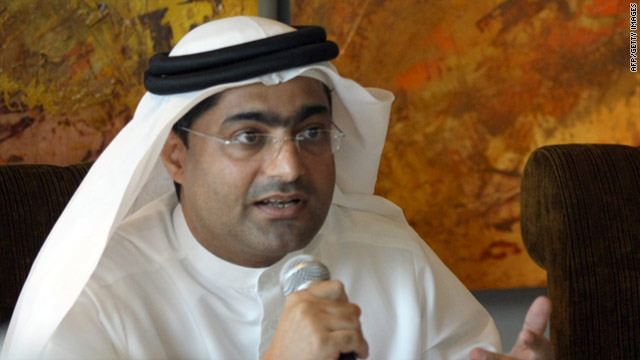Rights groups urge the UAE to drop charges against activists

- They face charges of public insult against the president
- Human Rights Watch accuses the UAE of misusing the law to persecute free speech
- UAE authorities have not seen street protests but helped fight protesters in Bahrain
- All five defendants have pleaded not guilty; their trial resumes Monday
(CNN) -- Four human rights organizations are urging authorities in the United Arab Emirates to drop charges against five pro-democracy activists.
Court proceedings against the five men wrapped up Monday and are scheduled to resume July 25.
They face charges of public insult against the president of the UAE and other top officials, the groups said in a statement.
All five defendants have pleaded not guilty.
The four groups jointly calling for charges to be dropped are Amnesty International, the Arabic Network for Human Rights Information (ANHRI), Front Line Defenders and Human Rights Watch.
The groups accuse UAE authorities of misusing the defamation charges "as a pretext" to punish the activists for peacefully expressing their opinions, they said in a statement.
"We consider all five men prisoners of conscience and call on the UAE authorities to release them unconditionally," said Philip Luther, Middle East and North Africa deputy director at Amnesty International.
Other charges against the men, who police detained in April, include undermining the public order and opposing the government system.
They have been "held in preventative custody," according to UAE's state news agency WAM.
The best-known of the five activists on trial is Ahmed Mansour Ali Abdullah Al Abd Al Shehi, more commonly known as Ahmed Mansour.
He is a "leading human rights activist who had publicly called for political freedoms and an elected parliament," Human Rights Watch said. Mansour also is a member of Human Rights Watch's Middle East advisory committee.
Mansour "faces additional charges for inciting others to break the law, calling for an election boycott, and for demonstrations," the four groups said.
On trial with him are economist Nasser Ahmed Khalfan bin Gaith, Fahad Salim Mohammed Salim Dalk, Hassan Ali Al Khamis -- all of the United Arab Emirates -- and Ahmed Abdul Khaleq, who "does not carry identification papers," state news reported.
All were arrested on the heels of a recent decision by the UAE's government to dissolve the elected board of directors of the Jurist Association, a prominent civil rights organization in that country, and replace it with state appointees, according to Human Rights Watch.
The Jurist Association was one of four nongovernmental organizations that sent a petition in March 2011 to UAE President Sheikh Khalifa bin Zayed Al Nahyan and other authorities asking for direct elections.
Ahmed Mansour signed the petition, which also demanded authorities turn over legislative powers to a representative body known as the Federal National Council, which exercises an advisory function.
FNC elections are scheduled for September, according to state media.
Authorities justified the sacking of the association's elected board, saying it had violated a law banning nongovernmental organizations from interfering "in politics or in matters that impair state security and (the) ruling regime."
Human Rights Watch has accused UAE authorities of acting against its own free speech guarantees as well as those propagated by regional and international provisions.
The UAE are "reacting to domestic criticisms by banning websites, detaining peaceful activists and intensifying its chokehold on civil society," Human Rights Watch claims.
The country has not faced street protests, but authorities are sensitive to the unrest sweeping the Arab world.
Long-standing regimes in Tunisia and Egypt were toppled earlier this year, and Damascus has launched a violent crackdown against protesters in Syria.
Libya is currently in the midst of a full-blown war involving supporters and opponents of strongman Moammar Gadhafi.
Both the UAE and Saudi Arabia recently sent troops to nearby Bahrain to help quell an uprising there.
While concerned with rising ethnic and sectarian strife in the region, authorities in the UAE also have to contend with potentially explosive immigration concerns. More than 8 million people live in the UAE, but Emiratis account for only 11.5% of that total.
Migrant workers comprise the bulk of the population in the country.
Jenifer Fenton contributed to this report
